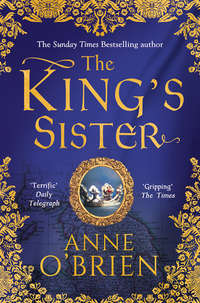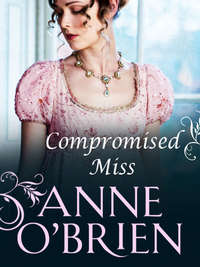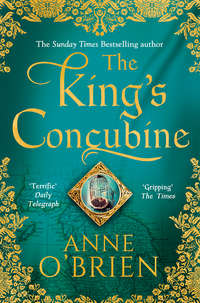
Полная версия
Battle-Torn Bride


About the Author
ANNE O’BRIEN
was born and lived for most of her life in Yorkshire, England. Here she taught history, before deciding to fulfill a lifetime ambition to write romantic historical fiction. She won a number of short story competitions until published for the first time by Harlequin®.
As well as writing, she finds time to enjoy gardening, cooking and watercolor painting. She now lives with her husband in an eighteenth-century cottage in the depths of the Welsh Marches.
Dear Reader
I wrote the love story of Richard and Beatrice from a true happening in the Wars of the Roses, when lovers were parted by a diplomatic marriage arranged by the lady’s father. The elderly husband met his death on the battlefield at the hands of the lover. Against all the odds, the lovers were reunited and were able to marry. The stuff of high romance indeed!
This led me to wonder how many lovers were torn apart, their love shattered by the callous indifference of an arranged marriage, or by the tragedy of national events which led to bloody and heartbreaking deeds on the battlefield. So Richard and Beatrice suffer brutal separation brought about by influences and treachery far beyond their control. It would take a particular strength of understanding, love and trust between the lovers to overcome such potential heartache, and I set myself to explore it.
I was delighted to create for Richard and Beatrice a true fulfillment out of tragedy and loss.
Do enjoy it,

BATTLE–TORN BRIDE
Anne O’Brien

Prologue
“I loved you. I looked for marriage with you. Yet you betrayed me, Richard. You betrayed our love.”
“Betrayed? What is this …?”
“I think you never loved me at all. It was simply a Twelfth Night flirtation to be cast aside by Candlemas.”
“Beatrice … how can you think that? My heart is yours—has always been yours.”
“I expect you forgot me as soon I was out of sight.”
“Never that. You dishonor me!”
“If that is so—if you truly loved me—how could you abandon me to a marriage with a man such as William Somerton? You have broken my heart, Richard Stafford.”
Chapter One
July 1460: Great Houghton Hall, a golden-stoned manor house.
Lady Beatrice Somerton followed one of her serving maids, who was skillfully balancing tankards and a flagon of ale on a heavy tray, into the Great Hall. Two more of her servants, hastily borrowed from their kitchen duties, came behind her with platters of bread and cheese and slices of cold meat. Another with a dish of mutton pasties. In the Hall were some half a dozen gentlemen, sitting or standing, engaged in deep conversation. Newly arrived, their clothes and boots were covered with dust from a morning’s hard riding. It could be noted from their swords and slim-bladed daggers that they were well-armed.
Their conversation, of a political content and subject to some ribald comment, dried as the lady entered. She was clearly the mistress of the house despite her lack of years. Young and slight of figure she might be, but she bore herself with unmistakable dignity and calm authority. Her manner was forthright, her whole demeanor used to obedience from those who served her. The gentlemen who were seated on bench or stool rose to their feet. Bowed with respect and not a little admiration. Lady Beatrice Somerton was quite beautiful and a force to be reckoned with.
“Be at ease, gentlemen.” She swept them with a smile. “I think ale will be welcome here.”
“Very. We are grateful, my Lady Somerton.” One of the gentlemen stepped forward to bow before her with practiced gallantry. A most attractive lady and not as one would have expected in this household, having met the lord, Sir William Somerton. This lady was many years his junior.
The lady directed her maids who began to pour the ale, watched as they placed the platters, put out pewter plates and knives on the oak table. Looked round to ensure that all was in order.
“If you require anything more, sirs, Betsy will remain within call.” She nodded to the maid at her right hand who dimpled with pleasure and expectation.
Then Beatrice turned to go—but where? To her own chamber or out into the garden, she supposed. She would not be required to attend her husband and his most important guest who were now closeted, alone, in the parlor. That had been made very clear. Any further needs of the visitors could safely be left in the capable hands of the steward, Master Lawson.
Another gentleman entered the vast room with its beamed roof and gleaming paneled walls, after seeing to the deployment of the armed retinue that had accompanied them to Great Houghton. Drawing off his gloves, removing his hat, he placed them on the coffer by the door, then ran his hand through dark hair, which waved around an arresting face. Approached the table with its promise of a long draft of ale to wash away the dust of summer roads.
And came to a halt in the center of the room.
As, at exactly the same moment, did Beatrice Somerton.
His face was suddenly smoothed of all expression, the thought of the ale wiped from his mind. His body went still. His hands tight-fisted at his side.
Her eyes widened, lips parted in shock. The blood drained from her face to leave her skin as pale as the lace decoration on the bodice of her velvet gown. Her fingers tightened on the edge of the empty tray that she would have carried back to the kitchen.
Tension wound the emotions between them to near breaking point, as taut as an expert Glamorgan archer would stretch the waxed-hemp bowstring as he prepared to loose an arrow with deadly accuracy. Surely the tension was obvious to everyone in the room as a living breathing thing? Except that, as Beatrice was faintly aware, the conversation behind her ebbed and flowed as if nothing were amiss: the visitors continued to concentrate on the food and ale and their own comforts.
At last the lady and gentleman found words. But not of any importance or significance for those who might overhear. Nothing to indicate the rapid leap of pulse, the thud of heart against ribcage, the surge of heat through the blood. It was as if their wits had been stripped away in that one moment of meeting.
“My lady. I had not thought …”
“Lord Richard. I did not know …”
Beatrice dropped the tray she was still holding onto the table beside her with a loud clatter. She discovered that she had been holding her breath. When the day dawned it had promised nothing new, nothing out of the way. No occurrence to disrupt her uneventful life, day after day, here at Great Houghton. Surely there should have been some warning. Some indication, some premonition. In the weather perhaps—a violent storm—or in the presence of a magpie, strutting in the kitchen garden, with all its dire warnings and omens. There had been no heralding of this—this disaster!
And yet here in her home was the one man who had the power to turn her life on its head, with a single look from those eyes with their hooded lids, dark and watchful as a hovering raptor, that were even now intent on hers. The one man who could have turned her life to pure gold, causing her heart to throb with joy, her blood to heat with passion at his slightest touch. And what had he done? Why nothing—except to forsake her. Abandoning her to a cold, lonely existence with a man who disliked her, ignored her, humiliated her. To an existence without love.
The day, a warm midsummer’s day when bees flooded the lavender stalks and swallows darted through the gaps in the stable doors to feed their offspring, had indeed started normally enough. Then, perhaps an hour after the midday meal, Sir William Somerton strode through the courtyard and into the stone-flagged entrance hall of his elegant but strongly defended manor house. He stood there, squinting in the sudden gloom, hands fisted on hips.
“Beatrice!” His voice rebounded off the warm stone. “Beatrice!” His frown deepened as he raised his voice further.
No response. The house remained silent around him. The tapestried hangings absorbed the sound.
“Beatrice. In God’s name, where are you, girl?” He was halfway to the foot of the staircase with a hiss of ill-temper, when a lady appeared on the half landing, and came to a halt, looked down over the carved balustrade.
“There you are. What are you doing? Why are you never around when I need you? We have visitors, it seems. Perhaps a score or more, so the sentry reports.”
“I have been folding linen and storing it with herbs against the moth,” the lady explained to answer her lord’s first question. Her voice, composed despite her peremptory summons and its rough tone, contained no apology. She descended the stairs slowly, not quite to the bottom, so that her eyes, the deep purple of the heartsease in her herb garden but on this occasion lacking their tender gentleness, were on a level with Sir William’s. Her gaze was direct and did not fall before his fierce stare.
“Who is it who visits, my lord?”
“Lord Grey de Ruthin, by my soul.” Somerton’s grizzled brows merged into one heavy line at the prospect. His thin lips thinned further. “A black ragged staff, clear enough to see emblazoned on all the livery of the escort and on the standard. All very fine and imposing! He is accompanied by a number of gentlemen as well as an armed retinue. Quite an entourage, in fact.” Sir William stared at his wife. “What in God’s name will de Ruthin want?” A demand, as if Beatrice would know the answer. “I warrant I have paid my feudal dues to him this year.”
“I expect he will tell us soon enough.”
Beatrice recognised the name. A powerful magnate with influential friends. A Lancastrian, as were they, prepared to lead his retained army in the name of his Majesty King Henry VI against the traitorous might of the Dukes of York and Warwick who would seize the Crown and make York king.
William turned on his heel to stalk to the door at the sound of the gates being opened and the first of the mounted escort entering the courtyard. “Make preparations. Immediately!”
“What do you require?” Quite unruffled, Beatrice stepped down into the Hall, well used to speaking to her lord’s back.
“Ale and food for Lord Grey and the gentlemen. Tell Lawson to arrange ale for the men-at-arms in the courtyard.” He stepped outside, fists still on hips, to oversee the arrival. “I doubt they will stay long.”
Lord Grey de Ruthin and his undoubtedly impressive following clattered across the bridge over the moat and into the enclosed courtyard. Beatrice watched them from the open door. Glossy horseflesh, smart livery, the glint of sun on polished weapons and harness. The black ragged staff floating arrogantly over all, was imprinted on the breasts of the armed retainers.
William still stood and waited on the steps, very much the master of the Hall. He would not be intimidated in his own home, even though he realised the danger of antagonising this man to whom he owed feudal allegiance for the two prosperous manors of Letcham and Rosedale.
Beatrice had issued instructions to Master Lawson and was now tempted to linger to watch and listen. Something out of the way, something of importance to intrigue and interest, far more entertaining than folding linen and chasing moths. But, sensing her presence, William turned on her.
“Go about your work, madam. This is no place for you.”
So she withdrew a few steps, not bothering to hide the flounce of resentment, the swish of skirts. Not that William would notice. How dare he address her as if she were one of the servants! This man who was her husband, though not of her choosing, a man who was older than her own father would have been, had he lived. A man who treated her as nothing better than a chatelaine to manage his household and see to his comfort, in spite of the substantial dowry she had brought him, not to mention the alliance with the Hattons of Mears Ashby, her own influential family with their high-bred connections. The truth was that he had no need of her other than as a housekeeper and certainly no liking for her. Patience was not often in evidence in Sir William’s manner. He even preferred the ample figure of one of the serving maids to warm his bed. For which Beatrice realised she should be grateful, of course. William had an heir from his first marriage—two full-grown sons to carry on the family name. So Beatrice Hatton was an irrelevance—other than as a source of wealth and influence in local affairs.
She showed her teeth in nothing like a smile, but stepped back into the Hall, unwilling on this occasion to court her lord’s unpredictable wrath. Withdrawing, however, no farther than the shadows in the doorway from where she could still listen.
The gentlemen, perhaps six of them, dismounted in a flurry of activity and sharp orders. Lord Grey approached. His authority lay on his shoulders as evident as the heavy cloak, which he now discarded with the increasing warmth of the sun and draped over his horse’s withers. Stern of face, he was clearly not a man to brook disagreement with his demands.
“My Lord Grey. Welcome to Great Houghton Hall.” Sir William inclined his head in brusque recognition, managed a wintry smile at odds with the warmth of the afternoon.
“Somerton. I am grateful.” De Ruthin responded in like manner, equally cool. The noble visitor made it abundantly clear that here was no time for the niceties of extended greeting. “I would speak with you. A matter of urgent business—to be settled without delay.”
“All business is urgent with armies in the field, my lord.”
“And particularly when a battle is imminent.”
A taut silence hovered over the courtyard as if no one cared to acknowledge the possibility of another battle. Only the clink of horse harness, the stamp of restless hooves.
“A battle?” Sir William raised his chin. “Do you say?”
“The king is at Northampton with his army.” Lord Grey clamped his hands around his sword belt. “He is camped between the town walls and the River Nene.”
Northampton! So close! Beatrice angled her head to hear more of the present state of affairs as de Ruthin continued.
“We have been given warning that the Earl of Warwick is approaching from the south with a considerable force. There will undoubtedly be conflict unless Warwick chooses to retreat. I think he will not.”
“What do you need of me, my lord?” Sir William frowned. “My loyalty to the Lancastrian cause and my fealty to you has never been in doubt.”
“As I am aware. King Henry is grateful.” De Ruthin removed his leather gauntlets and slapped them against his leg, releasing a cloud of dust. “I would speak with you alone, Sir William, if you will. A matter for your private ear only.” It was a request but a flat stare compelled Somerton to accede.
“Very well.” Sir William resisted a shrug. “If you would come with me …”
“My thanks, Sir William. These gentlemen who accompany me—perhaps some refreshment—we have been on the road for a lengthy time this day and have not eaten.”
“Of course.” Sir William stepped aside to allow Lord Grey to precede him into the house. Who knew when the ironfisted support of Lord Grey de Ruthin might not be advantageous in this never-ending conflict between the fluctuating powers of the royal houses of York and Lancaster. “All is prepared in the Great Hall for the gentlemen of your party. There will be ale and food for all …”
Beatrice had already vanished to take up her duties. Whatever the purpose of Lord Grey de Ruthin’s visit, she doubted that it would have any bearing on her existence in this cheerless house.
Конец ознакомительного фрагмента.
Текст предоставлен ООО «ЛитРес».
Прочитайте эту книгу целиком, купив полную легальную версию на ЛитРес.
Безопасно оплатить книгу можно банковской картой Visa, MasterCard, Maestro, со счета мобильного телефона, с платежного терминала, в салоне МТС или Связной, через PayPal, WebMoney, Яндекс.Деньги, QIWI Кошелек, бонусными картами или другим удобным Вам способом.








